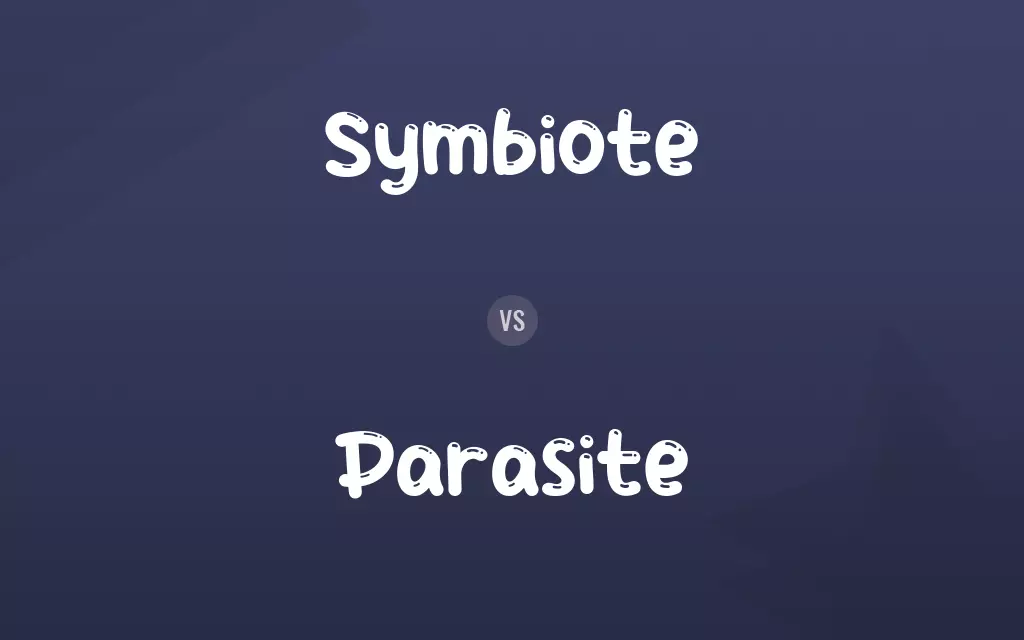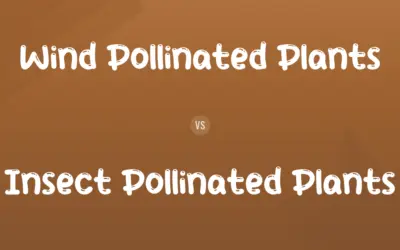Symbiote vs. Parasite: Difference and Comparison
Edited by Muazma Batool — By Muneeza Rehman — Updated on October 7, 2023
A symbiote engages in mutualistic relationships benefiting both organisms, while a parasite derives benefit at the expense of its host.

Difference Between Symbiote and Parasite
The terms "symbiote" and "parasite" both refer to organisms that live in close association with others. However, the nature of these associations is markedly different. A symbiote lives in a symbiotic relationship, which is a relationship where both organisms benefit. This mutual benefit is a hallmark of symbiotic interactions. On the other hand, a parasite exists in a parasitic relationship, wherein it derives benefits, often nourishment, from its host, leading to some degree of harm or detriment to the host.
Muazma Batool
Sep 28, 2023
In understanding the differences, it's crucial to recognize the spectrum of relationships in nature. While symbiotes promote a harmonious existence with their counterparts, parasites have a more one-sided advantage. For instance, the bacteria in our gut are symbiotes that help digest food and, in return, get a conducive environment to live. Conversely, a tapeworm in the intestines is a parasite; it absorbs nutrients that the host might otherwise use, potentially harming the host's health.
Muneeza Rehman
Sep 28, 2023
It is essential to note that not all symbiotic relationships are entirely mutualistic, meaning not all symbiotes benefit their partners equally. Some may offer minimal advantages to their partners. Yet, the distinction remains clear: symbiotes do not harm, while parasites do. Parasites often have specialized adaptations to exploit their hosts without getting detected or removed.
Muazma Batool
Sep 28, 2023
In popular culture, especially within science fiction, the term "symbiote" might be associated with alien entities forming mutual relationships with hosts, enhancing abilities or forming unique bonds. However, in biology, it remains grounded in the concept of mutual benefit. Conversely, the term "parasite" is often laden with negative connotations due to its exploitative nature.
Lucas
Sep 28, 2023
Symbiote vs. Parasite Comparison Chart
Nature of Relationship
Mutualistic, both organisms benefit
One-sided, benefiting the parasite at the host's expense
Muazma Batool
Sep 28, 2023
Evolutionary Adaptations
Co-evolve for mutual support
Adapt to exploit and often evade host's defenses
Muazma Batool
Sep 28, 2023
Dependency on the Host
Often can live independently
Typically depends on the host for survival
Jonathan
Sep 28, 2023
Example
Gut bacteria aiding in digestion
Tapeworm absorbing nutrients from the host's intestine
Nolan
Sep 28, 2023
Symbiote vs. Parasite Definitions
◉Symbiote
An organism in a mutualistic relationship where both benefit.
The clownfish and sea anemone are symbiotes, protecting and benefiting each other.
Muazma Batool
Sep 15, 2023
◉Parasite
An organism that depends on another for survival, often causing harm.
Malaria is caused by a parasite transmitted by mosquitoes.
Muazma Batool
Sep 15, 2023
◉Symbiote
An entity that co-exists for shared advantage.
Coral polyps and algae are symbiotes, providing shelter and nutrients respectively.
Henry
Sep 15, 2023
◉Parasite
An organism that has evolved to take advantage of another's resources.
The parasitic wasp lays its eggs inside caterpillars, where its larvae feed and grow.
Olivia
Sep 15, 2023
◉Symbiote
An organism forming a non-harmful association with another.
Birds picking insects off herbivores act as symbiotes, cleaning and feeding simultaneously.
Muneeza Rehman
Sep 15, 2023
◉Parasite
An exploitative entity in nature.
Fleas are external parasites causing discomfort to their hosts.
William
Sep 15, 2023
◉Symbiote
A partner in a cooperative interaction in nature.
The bee is a symbiote to the flower, aiding in pollination.
Muazma Batool
Sep 15, 2023
◉Parasite
An organism that lives on or in a host, deriving benefit at the host's expense.
Ticks are parasites, feeding on the blood of mammals.
Jonathan
Sep 15, 2023
◉Symbiote
An entity forming a harmonious bond with another for mutual gain.
Certain plants and fungi are symbiotes, aiding each other's growth.
Muneeza Rehman
Sep 15, 2023
◉Parasite
An entity that exploits another without offering any benefit.
The parasitic plant extracts nutrients from its host plant without giving anything in return.
Kaitlyn
Sep 15, 2023
◉Parasite
(Biology) An organism that lives and feeds on or in an organism of a different species and causes harm to its host.
Muneeza Rehman
May 03, 2023
◉Parasite
One who habitually takes advantage of the generosity of others without making any useful return.
Muneeza Rehman
May 03, 2023
◉Parasite
(pejorative) A person who lives on other people's efforts or expense and gives little or nothing back.
Muneeza Rehman
May 03, 2023
◉Parasite
(biology) An organism that lives on or in another organism of a different species, deriving benefit from living on or in that other organism, while not contributing towards that other organism sufficiently to cover the cost to that other organism.
Lice, fleas, ticks and mites are widely spread parasites.
Muneeza Rehman
May 03, 2023
◉Parasite
(historical) A retainer or companion of an ancient Celtic warrior, who praised him in song or poetry at gatherings; a bard.
Muneeza Rehman
May 03, 2023
◉Parasite
(aviation) A component of a composite aircraft which is carried aloft and air-launched by a larger carrier aircraft or mother ship to support the primary mission of the carrier.
Muneeza Rehman
May 03, 2023
◉Parasite
One who frequents the tables of the rich, or who lives at another's expense, and earns his welcome by flattery; a hanger-on; a toady; a sycophant.
Thou, with trembling fear,Or like a fawning parasite, obey'st.
Parasites were called such smell-feasts as would seek to be free guests at rich men's tables.
Muneeza Rehman
May 03, 2023
◉Parasite
A plant obtaining nourishment immediately from other plants to which it attaches itself, and whose juices it absorbs; - sometimes, but erroneously, called epiphyte.
Muneeza Rehman
May 03, 2023
◉Parasite
An animal which lives during the whole or part of its existence on or in the body of some other animal, feeding upon its food, blood, or tissues, as lice, tapeworms, etc.
Muneeza Rehman
May 03, 2023
◉Parasite
an animal or plant that lives in or on a host (another animal or plant); the parasite obtains nourishment from the host without benefiting or killing the host
Muneeza Rehman
May 03, 2023
◉Parasite
a follower who hangs around a host (without benefit to the host) in hope of gain or advantage
Muneeza Rehman
May 03, 2023
Symbiote vs. Parasite Frequently Asked Questions
Do parasites always harm their hosts?
Yes, parasites exploit their hosts, leading to some degree of harm or detriment.
Muneeza Rehman
Sep 28, 2023
Can a relationship be both symbiotic and parasitic?
No, while both are close associations, symbiotic is mutualistic and parasitic is exploitative.
Muazma Batool
Sep 28, 2023
Why do hosts tolerate parasites?
Hosts have evolved defenses, but parasites also evolve to evade detection and removal.
Muneeza Rehman
Sep 28, 2023
What is the main purpose of a symbiotic relationship?
A symbiotic relationship serves to benefit both organisms involved.
Muazma Batool
Sep 28, 2023
How do symbiotes affect their partners?
Symbiotes generally have a positive or neutral impact, benefiting or coexisting without harm.
Muazma Batool
Sep 28, 2023
Is every close association between organisms symbiotic?
No, associations can be symbiotic, parasitic, commensal, or predatory.
Levi
Sep 28, 2023
Can a symbiotic relationship turn parasitic?
While uncommon, changing conditions can shift mutualistic relationships to become more exploitative.
Elijah
Sep 28, 2023
Do all organisms have symbiotes?
No, but many organisms have symbiotic relationships at some stage in their life.
Levi
Sep 28, 2023
How do parasites reproduce?
Parasites have diverse reproductive strategies, often within or on their hosts.
Muneeza Rehman
Sep 28, 2023
Are parasites only found in animals?
No, parasites can be found in plants, fungi, and microorganisms too.
Muneeza Rehman
Sep 28, 2023
Content Creators
Written by
Muneeza RehmanAt Comparisons.wiki, Muneeza skillfully navigates the vast sea of information, ensuring clarity and accuracy as the lead content editor. With a keen eye for detail, she curates every comparison to enlighten and engage readers.
Edited by
Muazma BatoolAs a content editor, Muazma Batool is not just a grammar guru but a creative mastermind who breathes life into every word. With an eagle eye for detail and a passion for storytelling, she transforms bland text into engaging content that captivates audiences and drives results.






























